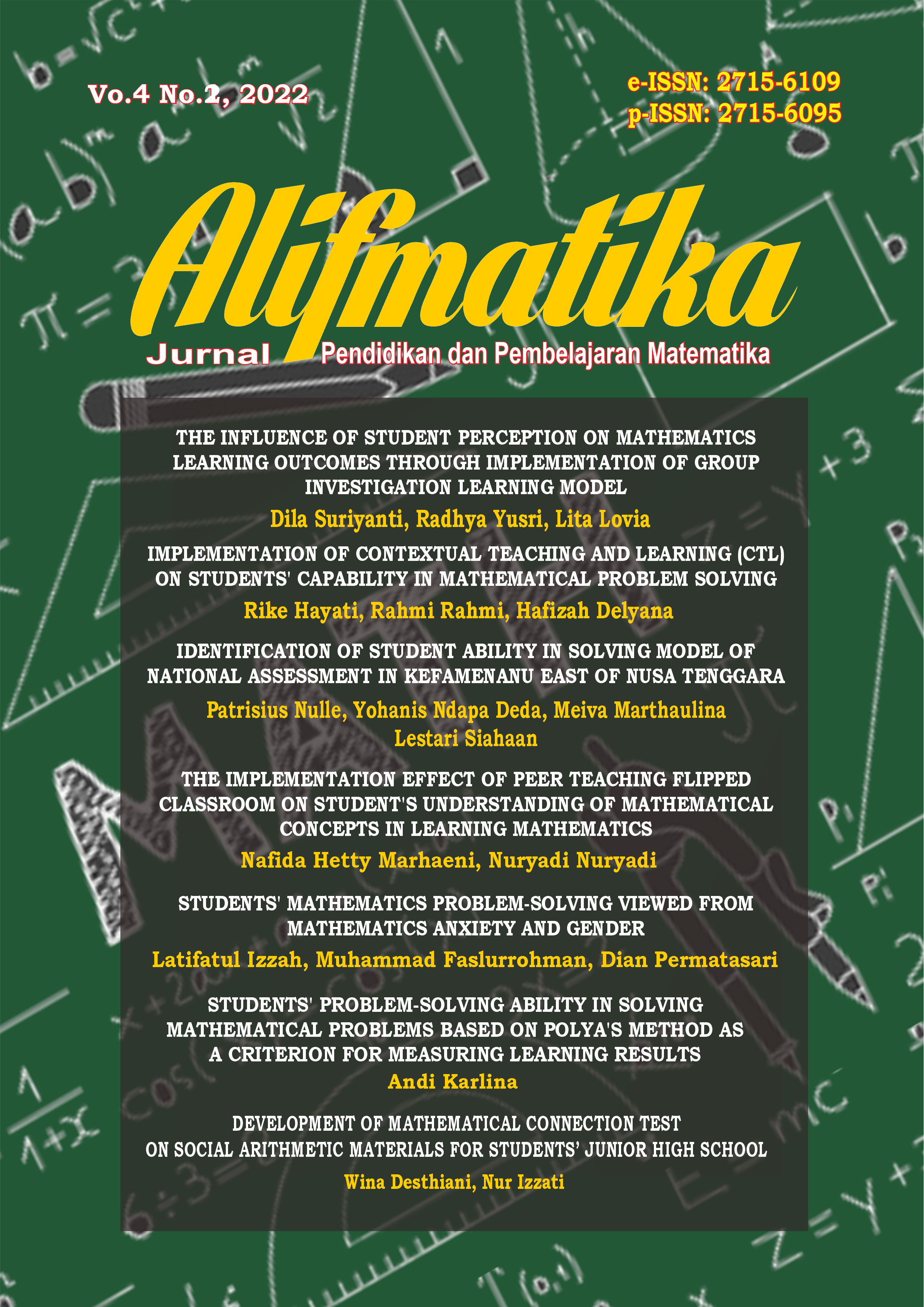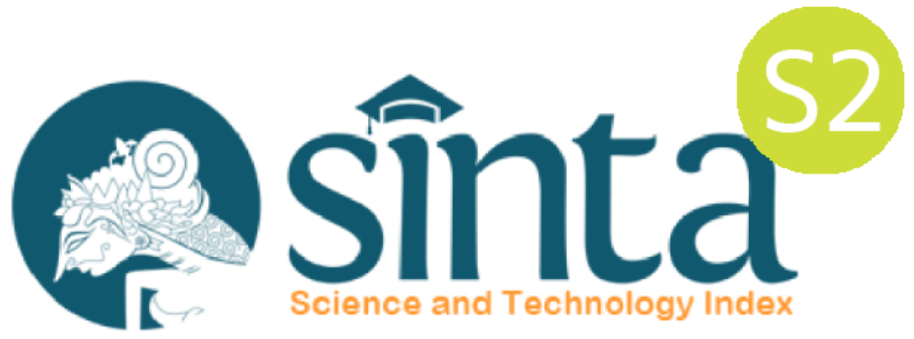IMPLEMENTATION OF CONTEXTUAL TEACHING AND LEARNING (CTL) ON STUDENTS' CAPABILITY IN MATHEMATICAL PROBLEM SOLVING
DOI:
https://doi.org/10.35316/alifmatika.2022.v4i2.122-134Keywords:
Contextual Teaching, Learning Model, Mathematics Learning, Mathematical Problem Solving AbilityAbstract
The purpose of this study was to determine whether students' mathematical problem-solving abilities by applying the Contextual Teaching and Learning (CTL) learning model were better than students' mathematical problem-solving abilities by applying conventional learning models. This research was motivated by the low mathematical problem-solving ability of students. This type of research was an experiment using a quantitative approach with a Noneequivalent posttest-only Control Group Design. The population of this study was all students of class XI Senior high school Negeri 1 Padang Gelugur. The technique used in this research was random sampling, so the sample of this research was class XI natural sciences major 1 as the experimental class and class XI natural sciences major 2 as the control class. The research instrument used was Post-test. The form of the test used was an essay with reliability of 0.399. Furthermore, the hypothesis was tested by a t-test. The results of hypothesis testing show that tcount > ttable was 7.17 > 1.67 so hypothesis one was accepted. Thus, it can be concluded that students' mathematical problem-solving abilities by implementing the CTL learning model were better than students' mathematical problem-solving abilities by applying conventional learning.
Downloads
References
Adiha, A. S., Mugara, R., & Puspita, R. D. (2022). Model Contextual Teaching and Learning (CTL) Pada Pemahaman Matematika Siswa Sekolah Dasar. COLLASE (Creative of Learning Students Elementary Education), 5(4), 802–808. https://doi.org/10.22460/collase.v5i4.6262
Agustina, I. (2020). Efektivitas pembelajaran matematika secara daring di era pandemi covid-19 terhadap kemampuan berpikir kreatif. Desimal: Jurnal Matematika, June, 1(1), 1–11. Retrieved from http://www.jurnal.ikipsaraswati.ac.id/index.php/suluh-pendidikan/article/view/243
Anggreni, I. A. K. N., Mangku, D. G. S., & Yuliartini, N. P. R. (2019). Analisis Yuridis Pertanggungjawaban Pemimpin Negara Terkait Dengan Kejahatan Perang Dan Upaya Mengadili Oleh Mahkamah Pidana Internasional (Studi Kasus Omar Al-Bashir Presiden Sudan). Jurnal Komunitas Yustisia, 2(3), 227–236. https://doi.org/10.23887/jatayu.v2i3.28787
Azila Azmi, A., Mohammad Amin Ahmad, M. A., Abdullah, A., & Shaw, G. (2019). Shopping in Malaysia: A Study of International Tourists’ Experience and Expectation. International Journal of Innovation, Creativity and Change, 8(4), 199–212. Retrieved from https://ssrn.com/abstract=3353166
Blayone, T. J. B., VanOostveen, R., Barber, W., DiGiuseppe, M., & Childs, E. (2017). Democratizing digital learning: theorizing the fully online learning community model. International Journal of Educational Technology in Higher Education, 14(1), 1–16. https://doi.org/10.1186/s41239-017-0051-4
Chityadewi, K. (2019). Meningkatkan Hasil Belajar Matematika Pada Materi Operasi Hitung Penjumlahan Pecahan Dengan Pendekatan Ctl (Contextual Teaching and Learning). Journal of Education Technology, 3(3), 196. https://doi.org/10.23887/jet.v3i3.21746
Dewi, P. S. (2018). Efektivitas Pendekatan Open Ended Ditinjau dari Kemampuan Pemecahan Masalah Matematis. Prisma, 7(1), 11–19. https://doi.org/10.35194/jp.v7i1.340
Hafriani, H. (2021). Mengembangkan Kemampuan Dasar Matematika Siswa Berdasarkan Nctm Melalui Tugas Terstruktur Dengan Menggunakan ICT (Developing The Basic Abilities of Mathematics Students Based on NCTM Through Structured Tasks Using ICT). Jurnal Ilmiah Didaktika: Media Ilmiah Pendidikan Dan Pengajaran, 22(1), 63–80. https://doi.org/10.22373/jid.v22i1.7974
Hamruni, H. (2015). Konsep Dasar Dan Implementasi Pembelajaran Kontekstual. Jurnal Pendidikan Agama Islam, 12(2), 177–187. https://doi.org/10.14421/jpai.2015.122-04
Hartini, H. (2017). Meningkatkan Hasil Belajar Matematika Melalui Pendekatan Contextual Teaching Learning (CTL) Materi Pecahan Kelas III MI AL MA’ARIF Kota Sorong. Jurnal Pendidikan, 5(2), 10–16. https://doi.org/10.36232/pendidikan.v5i2.122
Iwasaki, Y., Messina, E., Shank, J., & Coyle, C. (2015). Role of leisure in meaning-making for community-dwelling adults with mental illness: Inspiration for engaged life. Journal of Leisure Research, 47(5), 538–555. https://doi.org/10.18666/jlr-2015-v47-i5-5305
Jonathan Sarwono. (2010). Memadu Pendekatan Kuantitatif dan Kualitatif. Jurnal Ilmiah Manajemen Bisnis, 9(2), 119–132. http://ejournal.ukrida.ac.id/ojs/index.php/IMB/article/view/556
Latipah, E. D. P., & Afriansyah, E. A. (2018). Analisis Kemampuan Koneksi Matematis Siswa Menggunakan Pendekatan Pembelajaran CTL dan RME. Matematika, 17(1), 1–12. https://doi.org/10.29313/jmtm.v17i1.3691
Lestari, K. E., & Yudhanegara, M. R. (2015). Penelitian pendidikan matematika. Bandung: PT Refika Aditama. https://opac.perpusnas.go.id/DetailOpac.aspx?id=1192720
Maskur, R., Sumarno, Rahmawati, Y., Pradana, K., Syazali, M., Septian, A., & Palupi, E. K. (2020). The effectiveness of problem based learning and aptitude treatment interaction in improving mathematical creative thinking skills on curriculum 2013. European Journal of Educational Research, 9(1), 375–383. https://doi.org/10.12973/eu-jer.9.1.375
Muslihah, N. N., & Suryaningrat, E. F. (2021). Model Pembelajaran Contextual Teaching and Learning terhadap Kemampuan Pemecahan Masalah Matematis. Plusminus: Jurnal Pendidikan Matematika, 1(3), 553–564. https://doi.org/10.31980/plusminus.v1i3.1445
NCTM. (2000). Principles and Standards for School Mathematics. United States of America: The National Council of Teacher of Mathematics, Inc. Retrieved from National Council of Teachers of Mathematics website: https://www.nctm.org/uploadedFiles/Standards_and_Positions/PSSM_ExecutiveSummary.pdf
Oktavia, L., Hajani, T. J., & Egok, A. S. (2022). Penerapan Model Contextual Teaching and Learning (CTL) Terhadap Hasil Belajar Siswa Pada Mata Pelajaran IPA Kelas IV SD. Jurnal Ilmiah Aquinas, 261–269. Retrieved from http://ejournal.ust.ac.id/index.php/Aquinas/article/view/1840
Rahmawati, D., Nugroho, S. E., & Putra, N. M. D. (2014). Penerapan model pembelajaran kooperatif tipe numbered head together berbasis eksperimen untuk meningkatkan keterampilan proses sains siswa SMP. UPEJ Unnes Physics Education Journal, 3(1), 40–45. https://doi.org/10.15294/upej.v3i1.3109
Sabil, H. (2011). Penerapan pembelajaran contextual teaching and learning (CTL) pada materi ruang dimensi tiga menggunakan model pembelajaran berdasarkan masalah (MPBM) mahasiswa program studi pendidikan matematika FKIP UNJA. Edumatica, 1(1), 44–56. https://doi.org/10.22437/edumatica.v1i01.185
Sari, D. P. P., Muharrami, L. K., Hadi, W. P., & Munawaroh, F. (2019). Penerapan Model Pembelajaran CTL (Contextual Teaching and Learning) Berbantuan Wayang Dalam Pembelajaran Ipa Terhadap Hasil Belajar Siswa. Natural Science Education Research, 1(2), 155–162. https://doi.org/10.21107/nser.v1i2.4264
Sulistiani, I. R. (2020). Contextual Teaching and Learning ( CTL) Dan Pengaruhnya Terhadap Hasil Belajar Matematika Mahasiswa. Jurnal Ilmiah Pendidikan Dasar Islam, 2, 40–49. https://doi.org/10.33474/elementeris.v2i1.6966
Syahbana, A. (2012). Peningkatan kemampuan berpikir kritis matematis siswa smp melalui pendekatan contextual teaching and learning. Edumatica: Jurnal Pendidikan Matematika, 2(1), 45–57. https://doi.org/10.22437/edumatica.v2i01.604
Tohir, M., Maswar, M., Atikurrahman, M., Saiful, S., & Pradita, D. A. R. (2020). Prospective teachers’ expectations of students’ mathematical thinking processes in solving problems. European Journal of Educational Research, 9(4), 1735–1748. https://doi.org/10.12973/eu-jer.9.4.1735
Wasiah, U. (2021). Analisis Kesulitan Belajar Matematika Siswa SMP Dalam Pembelajaran Daring Pada Masa Pandemi Covid-19. Jurnal Pendidikan Matematika Universitas Lampung, 9(3), 307–317. https://doi.org/10.23960/mtk/v9i3.pp307-317
Yulizah, R., & Yuliyanti, L. (2015). Pengaruh model pembelajaran kontekstual terhadap hasil Belajar siswa pada kompetensi dasar mencatat transaksi dalam jurnal umum (Studi kasus pada siswa kelas XI IPS SMA Angkasa Lanud Husein Sastranegara Bandung tahun 2013/2014). Jurnal Pendidikan Akuntansi Dan Keuangan, 3(2), 41–50. https://doi.org/10.17509/jpak.v3i2.15438
Zebua, V., Rahmi, R., & Yusri, R. (2020). Analisis kesalahan siswa dalam menyelesaikan soal barisan dan deret ditinjau dari kemampuan pemahaman konsep matematis. Jurnal Lemma, 6(2), 122–133. https://doi.org/10.22202/jl.2020.v6i2.4088
Zuliyanti, P., & Pujiastuti, H. (2020). Model contextual teaching learning (CTL) untuk meningkatkan kemampuan pemecahan masalah matematis siswa SMP. Prisma, 9(1), 98–107. https://doi.org/10.35194/jp.v9i1.899
Downloads
Published
How to Cite
Issue
Section
License
COPYRIGHT NOTICE
Author (s) who publish in Alifmatika: Jurnal Pendidikan dan Pembelajaran Matematika agree to the following terms:
- The Author (s) submitting a manuscript do so on the understanding that if accepted for publication, copyright of the article shall be assigned to Alifmatika: Jurnal Pendidikan dan Pembelajaran Matematika, Tarbiyah Faculty of Ibrahimy University as the publisher of the journal. Consecutively, author(s) still retain some rights to use and share their own published articles without written permission from Alifmatika: Jurnal Pendidikan dan Pembelajaran Matematika. This work is licensed under a Creative Commons Attribution-ShareAlike 4.0 International License.
- Copyright encompasses rights to publish and provide the manuscripts in all forms and media for the purpose of publication and dissemination, and the authority to enforce the rights in the manuscript, for example in the case of plagiarism or in copyright infringement.
- Alifmatika: Jurnal Pendidikan dan Pembelajaran Matematika and the Editors make every effort to ensure that no wrong or misleading data, opinions or statements be published in the journal. In any way, the contents of the articles and advertisements published in Alifmatika: Jurnal Pendidikan dan Pembelajaran Matematika are the sole responsibility of their respective authors and advertisers.
- The Copyright Transfer Form can be downloaded here [Copyright Transfer Form Alifmatika]. The copyright form should be signed originally and send to the Editorial Office in the form of original mail, scanned document to alifmatika[at]ibrahimy.ac.id or upload the scanned document in the comments column when sending the manuscript.























_by_Matematohir.jpg)






